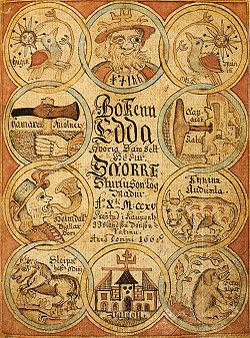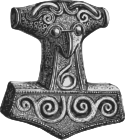Prose Edda
| Prose Edda | |
|---|---|
 This colourful front page of the Prose Edda in an 18th century Icelandic manuscript shows Odin, Heimdallr, Sleipnir and other figures from Norse mythology. |
|
| Author | Snorri Sturluson |
| Country | Iceland |
| Language | Old Icelandic |
| Genre(s) | Poetry |
| Publisher | Various |
| Publication date | Around 1220 |
| ISBN | n/a |
The Prose Edda, also known as the Younger Edda, Snorri's Edda (Icelandic: Snorra Edda) or simply Edda, is an Icelandic collection of four sections interspersed with excerpts from earlier skaldic and Eddic poetry containing tales from Nordic mythology. The work is often assumed to be written by the Icelandic scholar and historian Snorri Sturluson around the year 1220.
The Prose Edda begins with a euhemerized Prologue followed by three distinct books: Gylfaginning (consisting of around 20,000 words), Skáldskaparmál (around 50,000 words) and Háttatal (around 20,000 words). Seven manuscripts, dating from around 1300 to around 1600, have independent textual value. The purpose of the collection was to enable Icelandic poets and readers to understand the subtleties of alliterative verse, and to grasp the meaning behind the many kennings that were used in skaldic poetry.
The Prose Edda was originally referred to as simply the Edda, but was later called the Prose Edda to distinguish it from the Poetic Edda, a collection of anonymous poetry from earlier traditional sources compiled around the same time as the Prose Edda in 13th century Iceland.[1] The Prose Edda is related to the Poetic Edda in that the Prose Edda cites various poems collected in the Poetic Edda as sources.[2]
Contents |
Authorship
The assumption that Snorri Sturluson is responsible for writing the Prose Edda is largely based on the following paragraph from a portion of Codex Upsaliensis, an early 14th century manuscript containing the Prose Edda:
This book is called Edda. Snorri Sturluson compiled it in the way that it is arranged here. First it tells about the Æsir and Ymir, then comes the poetic diction section with the poetic names of many things and lastly a poem called the List of Meters which Snorri composed about King Hakon and Duke Skuli.[3]
It has been noted that this attribution, along with other primary manuscripts, are not clear whether or not Snorri is more than the compiler of the work and the author of Háttatal or if he is the author of the entire Prose Edda.[4] Whatever the case, the mention of Snorri in the manuscripts has been influential in the acceptance of Snorri as the author of the Prose Edda.[4]
Contents
Prologue
The Prologue is the first section of four books of the Prose Edda, and consists of an euhemerized Christian account of the origins of Nordic mythology: the Nordic gods are described as human Trojan warriors who left Troy after the fall of that city (an origin similar to the one chosen by Geoffrey of Monmouth in the 12th century to account for the ancestry of the British nation). According to the Edda, these warriors settled in northern Europe, where they were accepted as divine kings because of their superior culture and technology. Remembrance ceremonies later conducted at their burial sites degenerate into heathen cults, turning them into gods.
Gylfaginning
Gylfaginning (Old Icelandic "the tricking of Gylfi"[5]) follows the Prologue in the Prose Edda. Gylfaginning deals with the creation and destruction of the world of the Nordic gods, and many other aspects of Nordic mythology. The section is written in prose interspersed with quotes from skaldic poetry, including material collected in the Poetic Edda.
Skáldskaparmál
Skáldskaparmál (Old Icelandic "the language of poetry"[6]) is the third section of the Prose Edda, and consists of a dialogue between Ægir, a god associated with the sea, and Bragi, a skaldic god, in which both Nordic mythology and discourse on the nature of poetry are intertwined. The origin of a number of kennings are given and Bragi then delivers a systematic list of kennings for various people, places, and things. Bragi then goes on to discuss poetic language in some detail, in particular heiti, the concept of poetical words which are non-periphrastic, for example "steed" for "horse", and again systematises these.
Háttatal
Háttatal (Old Icelandic "list of verse-forms"[7]) is the last section of the Prose Edda. The section is composed by the Icelandic poet, politician, and historian Snorri Sturluson. Using, for the most part, his own compositions it exemplifies the types of verse forms used in Old Norse poetry. Snorri took a prescriptive as well as descriptive approach; he has systematized the material, and often notes that "the older poets didn't always" follow his rules.
Notes
References
- Byock, Jesse (Trans.) (2006). The Prose Edda. Penguin Classics. ISBN 0-14-044755-5
- Faulkes, Anthony (Trans.) (1995). Edda. Everyman. ISBN 0-460-87616-3
- Grape, Anders. Kallstenius, Gotfried. Thorell, Olof (Trans.) (1977). Snorre Sturlusons Edda: Uppsala-Handskriften DH II, vol. II. Uppsala.
See also

This article is part of a series on: |
|||
|
Dialects
Old West Norse
(Old Icelandic · Old Norwegian · Greenlandic Norse) Old East Norse (Old Danish · Old Swedish) Old Gutnish Use
Literature
Poetry
(Alliterative verse) Sagas (Sagas of Icelanders) Edda (Poetic Edda · Prose Edda) First Grammatical Treatise Ancestors
|
|||
- Edda
External links
- Uppsala Edda
- Edda Snorra Sturlusonar Old Norse text, Guðni Jónsson's edition.
- The Prose Edda, translated by Arthur Gilchrist Brodeur, at sacred-texts.com
- Critical editions of all major redactions of the Prose Edda in pdf format at septentrionalia.net
- The Younger Edda at Project Gutenberg, Rasmus B. Anderson's translation (1897)
- The Elder Eddas of Saemund Sigfusson; and the Younger Eddas of Snorre Sturleson at Project Gutenberg, translated by Benjamin Thorpe (Elder Eddas) and I. A. Blackwell (Younger Eddas). (1906)
- Prose Edda Arthur G. Brodeur's translation (1916)
- The Younger Edda (1901) Rasmus B. Anderson's translation
- The Younger Edda : also called Snorre's Edda, or the Prose Edda. An English version of the foreword ; The fooling of Gylfe, the afterword ; Brage's talk, the afterword to Brage's talk, and the important passages in the Poetical diction (Skáldskaparmál) (1880, c1879) Rasmus B. Anderson's translation
|
||||||||
|
|||||||||||||||||||||||||||||||||
